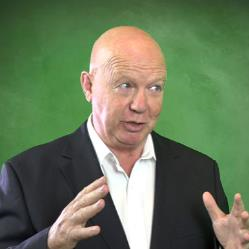
Last week Tony J. Hughes was identified as one of the global Top 50 Sales Influencers by the Top Sales World magazine.
In this interview John Smibert asked him what he did to earn this honour.
In particular I asked him what sales professionals can learn from what he did in order to enhance their own influence and relationship with their target customers.
He suggests that sales people must learn how to write and publish content - content that is of valuable to their customers. He also stressed the importance of not selling on social media. Use it to engage and build a foundation for a future relationship. Tony talked about how he personally does this.
Tony J. Hughes is a author, speaker, and a thought leader in the B2B sales world.
See more of the 'TALKING SALES' series here
Interview
John: Welcome back! I'm delighted to have Tony Hughes with me again. Tony, you've just been named one of the top 50 influencers in the professional sales world by the Top Sales Magazine.
Tony: Thank you!
John: That's a great achievement - well done!
Tony: It really took me by surprise actually - and it was on the back of being listed as one of the top 100 people in social selling this year as well.
John: Yes. and the thing that I find intriguing is that you've come from almost nowhere to do that in less than 12 months.
Tony: Itt would certainly look like that to a lot of people. I had been reasonably active in social, but I wasn't really doing much publishing. It was you that inspired me back in November last year, to get active in building my personal brand. I did my research, and you were a part of that. Also, a guy called David Meerman Scott was really good in his book, but I decided to get very active in social publishing, and it's the thing that made the difference.
John: So, what I'd like for the audience here - and the audience are primarily sales professionals, sales managers and sales leaders - is to learn from what you did. I think it's really important to understand what you did can be applicable to most salespeople out there.
Tony: Yes.
John: So, let's talk about how you went about that. What was important, what worked?
Tony: Well, the first thing we all need is we need some sort of unique IP. I know nothing's truly unique really, but for me I had a unique sales methodology that I've worked with for years, and then I also developed a definition of strategic social selling, those five pillars that I talk about,
John: The five pillars of social selling.
Tony: What I decided to do was to give away my IP, really a "pay it forward" strategy, and just start publishing unique, high value content. A lot of people adopt a strategy of curation, where they'll just re-tweet and repost other people's content, but in my research I decided that unique content was going to be the difference.
John: And we've talked about that in other interviews, and we'll talk about it in the future, but your recommendation is that all salespeople should look at doing some writing.
Tony: Yes, and it's controversial. There's plenty of people that disagree with me, but it's important for a couple of reasons. We want salespeople to carry better conversations to more senior people, when they go and sell. If someone writes about something they'll come to understand it a lot better, and they'll be able to carry the conversation. We often think we know things in our head, but when we go to write it down we discover we're really not where we need to be.
John: And what we're writing as a salesperson has nothing to do with our product, our company, or whatever.
Tony: It's true.
John: It's all about what the customers can achieve, the challenges they're facing, and how they're addressing those challenges, right?
Tony: Yes.
John: Because that's what customers need to know.
Tony: It's true, and it really goes into the second part of my strategy. So, it was a unique content publishing strategy, and another piece of it was that I didn't connect and sell with people in social. It was connect with people, and really provide some value, provide information for them without pushing myself in any way at all.
John: So, a key lesson in social media is that there's no selling on social media.
Tony: Correct. It's connect and engage, it's not connect and sell.
John: And then the selling happens face-to-face later on.
Tony: Yes. All of the rules that apply to professional selling in the physical world apply online. For example, you wouldn't be at a networking event with somebody and start jumping in their face and selling to them prematurely - you would build that relationship and listen before you would start to push anything. Social media engagement is the same.
John: Okay. Now I'm like a lot of salespeople - I'm not a great writer, I don't write a lot. I'm trying to get a little bit out there, and hopefully put a bit of value on the table, but I know you took a totally different strategy - starting last November you wrote 200 articles in, what, less than six months?
Tony: Yes. It was a lot of work, and I'm not going to stand here and pretend that most people can write 200 unique, quality posts in six or seven months. But here's the thing, if a person doesn't read then I don't believe that they belong in the sales profession. You've got to read and stay current. And the other thing is, if you can't write then you can't sell. You've got to be able to write today, you've got to be able to really address the issue of your social credential, social proof. When someone checks you out online, do they see a person with credibility? You've got to be able to write.
John: So, the lessons I'm getting then is that as a salesperson, if we want to influence our target audience, our target market, our customers out there - the ones we haven't even met yet, let alone the ones we've met - we've got to share valuable content.
Tony: Yes.
John: And you're saying is that you get a lot more value if you actually write that content yourself rather than curating other people's content.
Tony: Yes, John, that's actually dead right. Because the reason you want to publish content is to attract people to you, and then also provide social proof when they check you out, that you're a person worthy of having a meeting.
John: And the second lesson I've got out of this is - 'no selling on social media'.
Tony: Correct.
John: It's all about creating value and giving to build credibility and trust and to open the for for engagement, it's not about trying to sell people in the ether.
Tony: Correct. It's 'connect and engage', not 'connect and sell'.
John: Tony, thank you very much! And look, congratulations - great effort to be the top 50 around the world. I think you've done extremely well, and it's well deserved.
Tony: Thanks, John!
****************
See more of the 'TALKING SALES' series here
****************

Your Invitation: I invite you to join the Sales Leader Forum group on LinkedIn where you can experience informative discussions with your peers and sales thought leaders on subjects like the one we have discussed here. I also invite you to subscribe to the
- Sales Leader Resource Centre here
- Sales Leader YouTube channel here (300+ sales leadership videos)
Please Share: If you valued this article, please share via your Twitter, LinkedIn, Google+ and Facebook social media platforms. I encourage you to join the conversation or ask questions. So feel free to add a comment on this post - I promise to respond. If inclined please follow my LinkedIn post page here.
Want to touch base? If you have questions please feel free to contact me - email: john.smibert(at)salesleaderforums.com, Phone: +61 404857893 or Skype: john.smibert